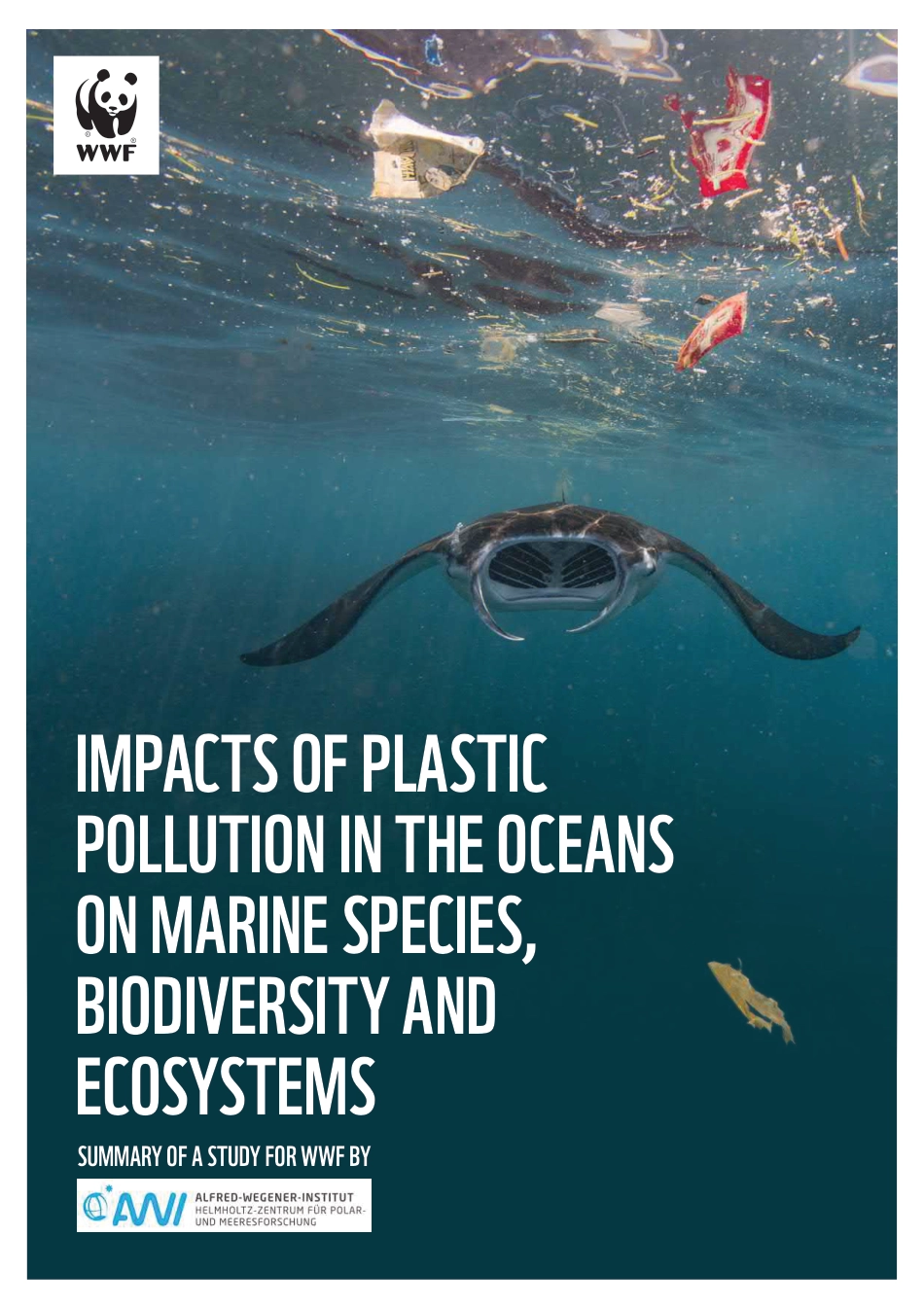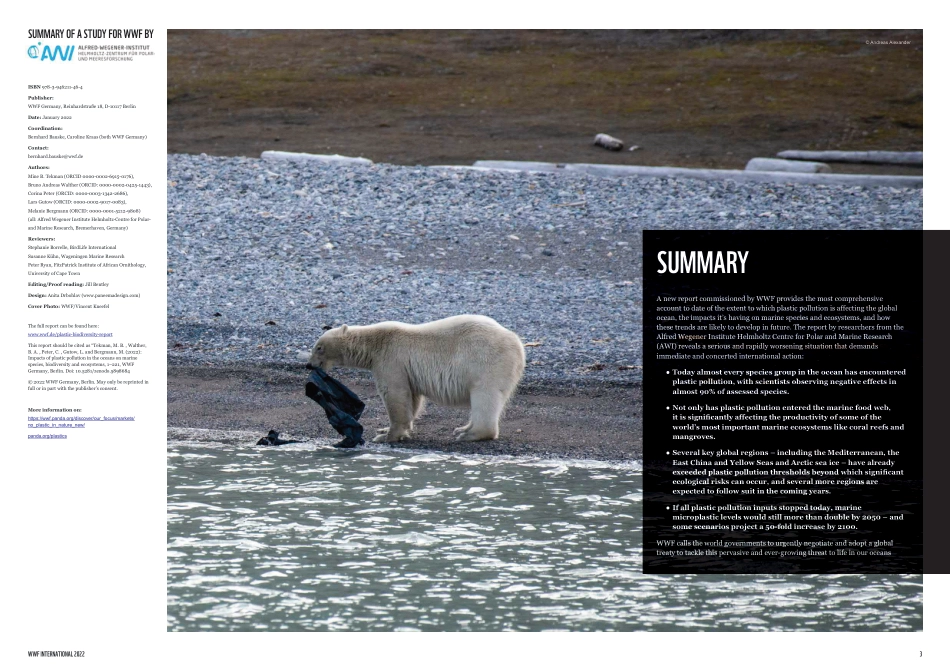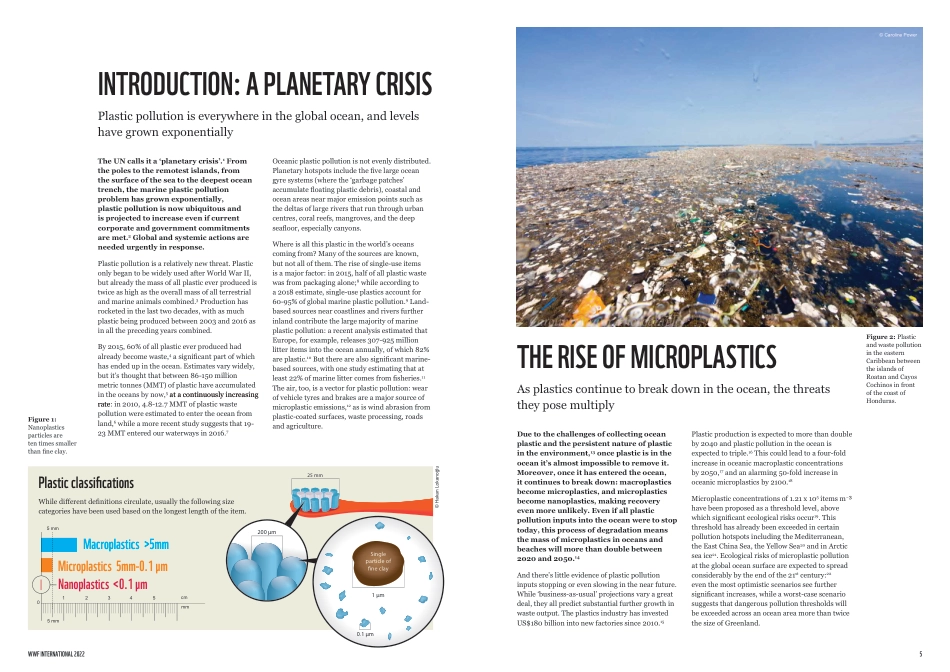IMPACTSOFPLASTICPOLLUTIONINTHEOCEANSONMARINESPECIES,BIODIVERSITYANDECOSYSTEMSSUMMARYOFASTUDYFORWWFBYSUMMARYOFASTUDYFORWWFBYWWFINTERNATIONAL20223SUMMARYAnewreportcommissionedbyWWFprovidesthemostcomprehensiveaccounttodateoftheextenttowhichplasticpollutionisaffectingtheglobalocean,theimpactsit’shavingonmarinespeciesandecosystems,andhowthesetrendsarelikelytodevelopinfuture.ThereportbyresearchersfromtheAlfredWegenerInstituteHelmholtzCentreforPolarandMarineResearch(AWI)revealsaseriousandrapidlyworseningsituationthatdemandsimmediateandconcertedinternationalaction:●Todayalmosteveryspeciesgroupintheoceanhasencounteredplasticpollution,withscientistsobservingnegativeeffectsinalmost90%ofassessedspecies.●Notonlyhasplasticpollutionenteredthemarinefoodweb,itissignificantlyaffectingtheproductivityofsomeoftheworld’smostimportantmarineecosystemslikecoralreefsandmangroves.●Severalkeyglobalregions–includingtheMediterranean,theEastChinaandYellowSeasandArcticseaice–havealreadyexceededplasticpollutionthresholdsbeyondwhichsignificantecologicalriskscanoccur,andseveralmoreregionsareexpectedtofollowsuitinthecomingyears.●Ifallplasticpollutioninputsstoppedtoday,marinemicroplasticlevelswouldstillmorethandoubleby2050–andsomescenariosprojecta50-foldincreaseby2100.WWFcallstheworldgovernmentstourgentlynegotiateandadoptaglobaltreatytotacklethispervasiveandever-growingthreattolifeinouroceans©AndreasAlexanderISBN978-3-946211-46-4Publisher:WWFGermany,Reinhardstraße18,D-10117BerlinDate:January2022Coordination:BernhardBauske,CarolineKraas(bothWWFGermany)Contact:bernhard.bauske@wwf.deAuthors:MineB.Tekman(ORCID0000-0002-6915-0176),BrunoAndreasWalther(ORCID:0000-0002-0425-1443),CorinaPeter(ORCID:0000-0003-1342-2686),LarsGutow(ORCID:0000-0002-9017-0083),MelanieBergmann(ORCID:0000-0001-5212-9808)(all:AlfredWegenerInstituteHelmholtz-CentreforPolar-andMarineResearch,Bremerhaven,Germany)Reviewers:StephanieBorrelle,BirdLifeInternationalSusanneKühn,WageningenMarineResearchPeterRyan,FitzPatrickInstituteofAfricanOrnithology,UniversityofCapeTownEditing/Proofreading:JillBentleyDesign:AnitaDrbohlav(www.paneemadesign.com)CoverPhoto:WWF/VincentKneefelThefullreportcanbefoundhere:www.wwf.de/plastic-biodiversity-reportThisreportshouldbecitedas“Tekman,M.B.,Walther,B.A.,Peter,C.,Gutow,L.andBergmann,M.(2022):Impactsofplasticpollutionintheoceansonmarinespecies,biodiversityandecosystems,1–221,WWFGermany,Berlin.Doi:10.5281/zenodo.5898684©2022WWFGermany,Berlin.Mayonlybereprintedinfullorinpartwiththepublisher’sconsent.Moreinformationon:https://wwf.panda.org/discover/our_focus/markets/no_plastic_in_nature_new/panda.org/plasticsWWFINTERNATIONAL20225INTRODUCTION:APLANETARYCRISISPlasticpollutioniseverywhereintheglobalocean,andlevelshavegrownexponentiallyTheUNcallsita‘planetarycrisis’.1Fromthepolestotheremotestislands,fromthesurfaceoftheseatothedeepestoceantrench,themarineplasticpollutionproblemhasgrownexponentially,plasticpollutionisnowubiquitousandisprojectedtoincreaseevenifcurrentcorporateandgovernmentcommitmentsaremet.2Globalandsystemicactionsareneededurgentlyinresponse.Plasticpollutionisarelativelynewthreat.PlasticonlybegantobewidelyusedafterWorldWarII,butalreadythemassofallplasticeverproducedistwiceashighastheoverallmassofallterrestrialandmarineanimalscombined.3Productionhasrocketedinthelasttwodecades,withasmuchplasti...



 VIP
VIP VIP
VIP VIP
VIP VIP
VIP VIP
VIP VIP
VIP VIP
VIP VIP
VIP VIP
VIP VIP
VIP